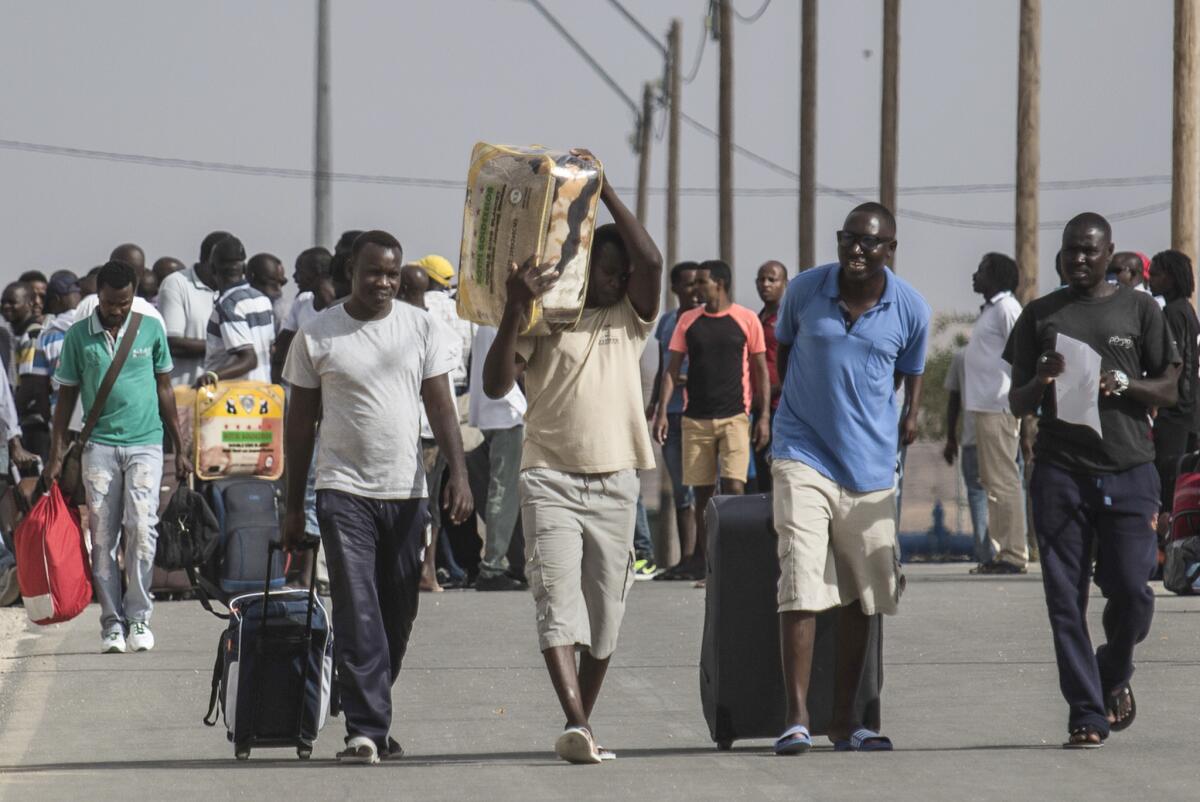Israel frees hundreds of African migrants from desert detention center

Israel released hundreds of African migrants from the Holot detention center in the Negev desert on Aug. 25, 2015.
- Share via
Reporting from Jerusalem — Israel on Tuesday began releasing about 1,200 African migrants from a remote desert detention facility after the Supreme Court overturned legislation allowing them to be held without charges for up to 20 months.
Nearly 600 people, who had been held at the Holot detention facility in southern Israel for more than a year, were sent on their way with sandwiches and $16 for bus fare. But they were prohibited from going to Eilat or Tel Aviv, two cities with large African communities and many Israeli residents who bitterly resent their presence.
Other cities aren’t eager to welcome the migrants either. The mayor of Arad said Tuesday that he had ordered inspections to keep migrants away from the desert city, which is also home to a large community of foreign workers in part because of its proximity to jobs at hotels and farms around the Dead Sea.
“I have nowhere to go now,” a 28-year-old Sudanese migrant who gave his name only as Faisal told reporters outside Holot. “I am glad to be out; this is a very important step. But it is just the first one. Where will I go and how far can I get with $16?”
Israel has been grappling with how to handle an influx of African migrants and asylum seekers that the country does not want but cannot return to their countries of origin. Most come from the strife-torn nations of Sudan and Eritrea, where they say their lives are at risk.
Tens of thousands of them have settled in the southern neighborhoods of Tel Aviv, straining the already run-down infrastructure of the blue-collar area where Israeli neighbors blame them for escalating crime.
Fierce protests by some residents have made it a hot-button political issue, with hawkish legislators pushing for tough new laws. The Supreme Court has three times thrown out legislation allowing for the long-term incarceration of Africans who enter the country illegally.
The completion of a massive fence along Israel’s sprawling border with Egypt at the end of 2013 has largely stemmed the flow of people who were being smuggled across the Sinai Peninsula. However, an estimated 46,000 African migrants and asylum seekers are already in Israel.
Israeli officials say most of the migrants, whom they refer to as “infiltrators,” are economic opportunists. Only a handful have been granted refugee status out of the thousands of requests over the years, according to activists.
Human rights groups accuse the government of dragging its feet about reviewing asylum applications and looking for ways to discourage Africans from staying, including making it extremely difficult for them to obtain work, housing and visas.
When Israel’s parliament returns from its summer recess, it will consider new legislation allowing for the repatriation of migrants to their countries of origin where possible or their removal to a third country, Interior Minister Silvan Shalom told Israel Radio on Tuesday.
If the tens of thousands of non-Jewish migrants are allowed to stay, Shalom said, their numbers would swell to half a million within a generation, and “Israel’s Jewish character will be eroded beyond recognition.”
Sobelman is a special correspondent.
More to Read
Sign up for Essential California
The most important California stories and recommendations in your inbox every morning.
You may occasionally receive promotional content from the Los Angeles Times.










